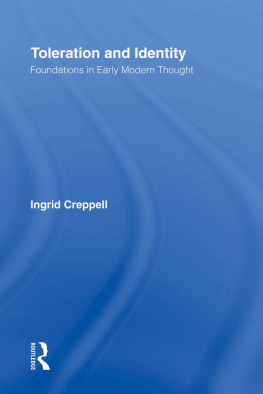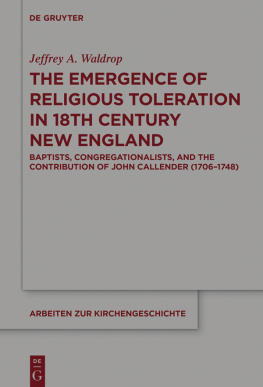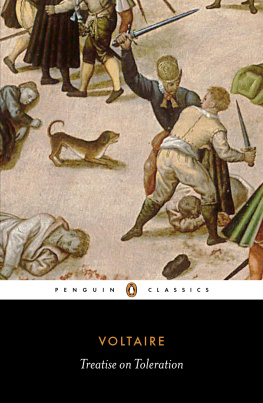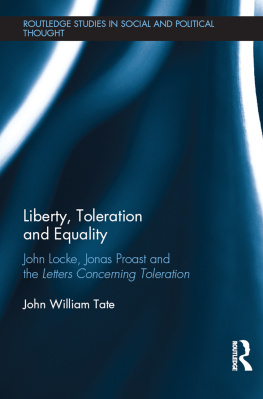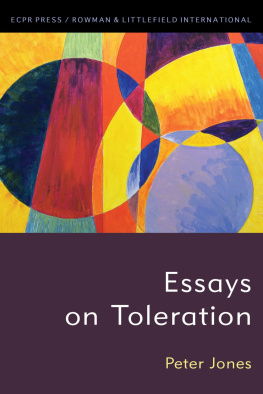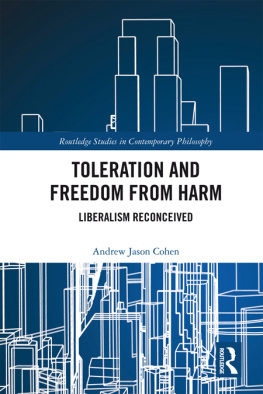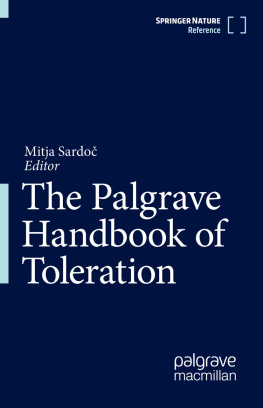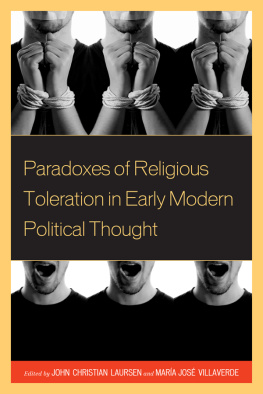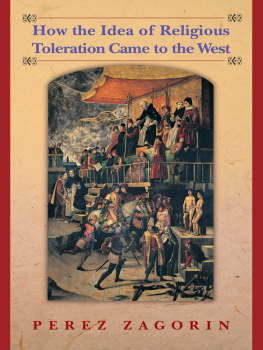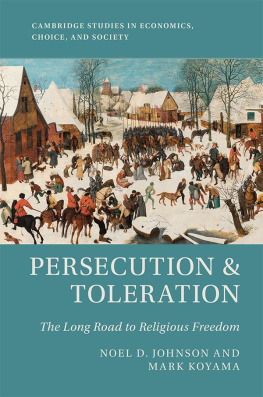
Toleration and Identity
Foundations in Early Modern Thought
This book is dedicated to Bob, Lillian, and Isaac.
Toleration and Identity
Foundations in Early Modern Thought
INGRID CREPPELL

Published in 2003 by
Routledge
270 Madison Ave,
New York NY 10016
www.routledge-ny.com
Published in Great Britain by
Routledge
2 Park Square, Milton Park,
Abingdon, Oxon, OX14 4RN
www.routledge.co.uk
Copyright 2003 by Taylor & Francis Books, Inc.
Routledge is an imprint of the Taylor & Francis Group.
Transferred to Digital Printing 2010
All rights reserved. No part of this book may be reprinted or reproduced or utilized in any form or by any electronic, mechanical, or other means, now known or hereafter invented, including photocopying and recording, or in any information storage or retrieval system, without permission in writing from the publishers.
Library of Congress Cataloging-in-Publication Data
Creppell, Ingrid.
Toleration and identity : foundations in early modern thought /c Ingrid
Creppell.
p. cm.
Introduction : basic reconceptionsLanguage and identity : making toleration a normBodin and the state : structuring a political selfMontaigne and the body : self-reflection in timeLocke and society : boundaries of recognition Defoe and the individual : forms of public judgmentRebuilding toleration.
Includes bibliographical references and index.
ISBN 0-415-93301-3ISBN 0-415-93302-1 (pb.)
DOI: 10.4324/9780203616451
1. Toleration. 2. Group identity. 3. Social conflict. I. Title.
HM1271.C73 2003
179.9dc21
2002073983
Contents
Acknowledgments
Many people and organizations have contributed generously as I pursued this project. I am very grateful for grants received from the George Washington university, the National Endowment for the Humanities, and the Woodrow Wilson Foundation. I would also like to thank in particular the Political Science Department at George Washington university for giving me vital support in the completion of this book.
As a student of political theory, I had the great fortune to study with four thinkers whose passion for questions of politics and theory has been a continual inspiration: Jon Elster, Russell Hardin, and Stephen Holmes at the university of Chicago, and Sheldon Wolin at Princeton. Though pursued in remarkably different ways, their work testifies to the importance of ideas engaged with the world. Their hard-headedness, wit and care for humanity impressed me years ago, and still do. I thank them for reading various incarnations and portions of this book, and for showing faith in my work at critical points over the years.
The following people provided excellent comments and support on various chapters of the text: Andrew Altman, Deborah Avant, Paula Backscheider, Robert Bartlett, Dario Castiglione, Richard Dees, John Ferejohn, Rainer Forst, Julian Franklin, Iain Hampsher-Monk, Don Herzog, Jack Knight, Alan Levine, Susan Liebell, Forrest Maltzman, Catriona McKinnon, Kimberly Stanton, Tracy Strong, Mark Warren, and Garrath Williams. I want to thank in particular Andy Altman, Richard Dees, and Alan Levine who read large chunks of the book and gave me extensive and invaluable feedback. Finally, I am greatly indebted to John Ferejohn for reading the entire manuscript with a fine blend of diligence and humor. The encouragement, generous support, and engagement of these and other extraordinary friends I have been blessed with wonderfully show how much we are allin thinking and doingdependent on each other.
I also want to thank my editor Eric Nelson for his immediate enthusiasm and the care he gave to bringing this book out. His work was absolutely essential to getting this project produced in a timely manner and with the focus on detail it has received. He, as well as Ben McCanna graciously put up with my numerous intrusions, and Lucia Read assisted me greatly with her copyediting.
Judith Shklar once asked me if toleration is love. The answer was no, but toleration does depend on a willingness to risk oneself that one first learns in the setting of a family. In some way, I have attempted to understand the issues of this book since I was a child, growing up in diverse cultures and in a highly conflictual but adoring family. Therefore, and for so many other reasons, profound acknowledgments go to my parents, Jacques and Claire Creppell, and my brothers and sisters for creating a world in which toleration was a constant experiment. I am grateful also to Lewis and Jean Mudge who have exemplified in their lives the virtues of toleration.
Finally, I thank my husband, Bob Mudge, whose humor, calm, and love provide me and our family refuge from many storms, and our children, Lillian and Isaac, whose existence gives my life its deepest meaning.
Preface
As I finished this book on toleration, the attacks of September 11th underscored the most striking question of politics since the collapse of the Soviet system_ increased communal conflict coming from religious, ethnic, and cultural identities. In response to this reinvigorated politics of identity throughout the world, toleration is offered as the solution. It may not appear that we need to rethink toleration itself but to insist on it ever more strongly. I undertook the study of the history of toleration before these events, because toleration and its origins seemed much less clear, more complex and enigmatic than appears on the surface. What became clear in my study is that toleration was in its inception and must again be directly concerned with identity politics, not to accept such a politics as is or to make it disappear but to understand and shape it. Toleration has always been intimately connected to this phenomenon that we call identity.
Conflict in some form seems inevitable to human existence. The most extreme problems that implicate toleration result from the fact that human beings continue to harm, dominate, and kill each other based on group attachments. To what extent can toleration be a response to these realities? The idea of toleration I explore and defend attempts to build accommodation in the clear recognition of the everpresence of conflict. The aim of this book is to understand how people have tried to make toleration work in the midst of deep conflicts. Historically, how did it emerge out of a politics and culture that would seem to have been antithetical to it? In looking at the first thinkers who struggled to create persuasive ideas of toleration, we learn about our own continuing attempts to do so.
Political, social, psychological, and cultural forces always harbor within them antitoleration forces. These forces come from many directions: groups with too little or too much power, in combination with imposition of superiority or demands for recognition and empowerment. The task of toleration is not to resolve once and for all the calculus of these forces, because that is impossibleour collective existence is forever mutating into new configurations of order and power. Indeed, we have to see our human predicament as exactly thata constant will and desire to balance and constrain the selfish, self-destructive, and domineering side of our natures. The work of toleration is continually to call our attention to what makes for mutuality and accommodation in the face of these larger forces, which we cannot often (usually) understand, much less control. Therefore, the work of toleration is never done. The suggestion that the need for it may one day disappear, that we will eventually achieve a measure of pluralism the peaceful acceptance of all differenceswhich will make toleration superfluous, is basically mistaken. The invention of toleration did not, as history has shown, lead to the realization of the Whig, Enlightenment view of historical development, in which social and political forces become progressively more open, peaceful, and rational.
Next page
